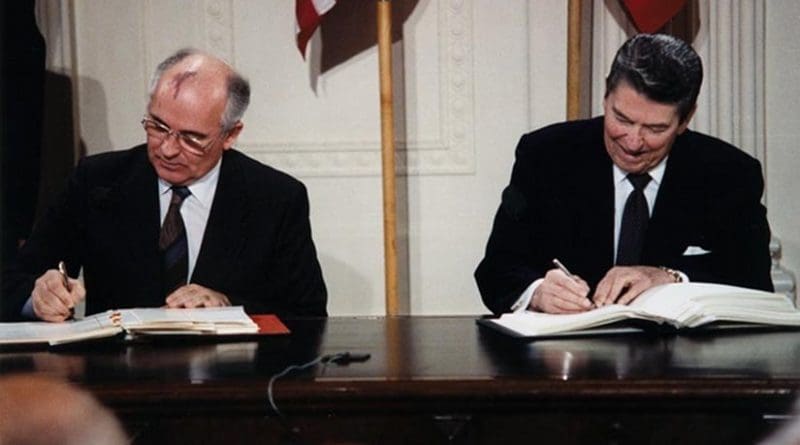End Of INF Treaty Shows US Has Finally Woken Up – OpEd
By Arab News
By Dr. John C. Hulsman*
The Intermediate-Range Nuclear Forces (INF) Treaty was a highlight of the 1980s, when the Cold War seemingly magically came to an end. Its recent jarring abrogation by the Trump administration bookends the fact that another era — that of America’s holiday from history (1989-2019) — is fast coming to an abrupt conclusion.
On Dec. 8, 1987, Ronald Reagan and Mikhail Gorbachev signed the INF Treaty, agreeing “not to possess, produce, or flight test” ground-based missiles with an intermediate range of 500 to 5,500 km. The treaty was a jewel in the crown of superpower rapprochement. By June 1, 1988, the US and the Soviet Union had disposed of at least 2,692 intermediate-range missiles.
But, ultimately, any treaty is only as durable as the geostrategic relationships underlying it. A beaten-down Russia was the first to chafe under the INF’s considerable restrictions. By the mid-2000s, the Putin regime was actively considering withdrawing from the pact. Moscow charged that the INF Treaty limited its ability to compete with China’s new intermediate-range missile deployments. Further, in 2007, the Russians became agitated with the US and NATO, charging that Western missile defense systems were utilizing launchers with offensive capabilities, violating the terms of the accord — an accusation the alliance denied outright.
By 2017, the shoe was on the other foot. Over the previous four years, four consecutive US State Department reports had accused Russia of violating the terms of the INF Treaty by developing the SSC-8: A ground-based cruise missile with an estimated range of 2,500 km.
Unlike the Obama administration, which simply tried to ignore Russian cheating in an effort to keep the pact together, the Trump White House has assumed a tougher posture altogether. On Dec. 4, 2018, Secretary of State Mike Pompeo formally announced the US believed Russia to be in “material breach” of the deal, issuing a 60-day ultimatum for it to comply.
Unsatisfied, on Feb. 1, President Donald Trump announced the suspension of American obligations under the INF accord, and signaled America’s intention to formally withdraw from the pact in six months. The very next day, Putin followed suit and the treaty ceased to be operational.
Both conventional American political readings of the demise of the once-revered INF Treaty — equally laden with prejudice — entirely miss the point of what is going on here. Democrats tend to see the US abrogation of the INF as just another sign of Trump’s lawlessness, believing the president never sees a pre-existing treaty he doesn’t crave to rip up. Republicans, on the other hand, tend to laud the White House’s stance, pointing out that Russian cheating is at last being taken seriously, and that the US will no longer be taken advantage of.
In reality, the end of the INF Treaty is extremely important, but for none of these surface reasons. Instead, what it signals is that rising American fears of China have crystallized into a new Cold War. For, crucially, China — which was merely at the beginning of its startling rise in the 1980s when the INF Treaty was signed — is not bound by the accord’s terms. American fears about Beijing reaping a significant strategic advantage because of this is the major reason the Trump administration is so keen to walk away from the deal.
According to the US Department of Defense, China possesses up to 2,650 intermediate-range land-based missiles. Under the increasingly bellicose regime of Xi Jinping, the People’s Liberation Army Rocket Force (PLARF), which is responsible for China’s land-based conventional and nuclear ballistic missiles, has been steadily strengthened. Particular emphasis has been placed on the deployment of intermediate-range cruise and ballistic missiles, the exact kinds prohibited to the US under the INF Treaty. As a result, China has achieved what many defense strategists believe to be a “missile gap” — an area of strategic competition in which Beijing’s capabilities actually outperform those of the US.
Even beyond the nuclear dimension, China has taken advantage of the gap to develop anti-access/area denial (A2/AD) missile capabilities to change the overall balance of power in the crucial first island chain between China and Japan, Taiwan, and the Philippines.
The Chinese strategy is aimed at negating the substantial American aircraft carrier advantage: The US has 11, the Chinese just two. The DF-21D anti-ship missile is specifically designed to sink carriers and has a possibly game-changing range of 1,500 km. China’s substantial medium-range rocket capabilities mean it can target US bases and forces as far out as Guam during any Sino-American conflict, posing a significant impediment to the transport of American reinforcements to the Pacific theater. All of these strategic realities mean that abrogating the INF Treaty at least allows America to play catch-up in the medium-range missile sphere.
But the meaning of all this is very clear even if it has been ignored, and it is of the greatest importance. In the intellectual haze that followed triumph in the Cold War, the US simply forgot that history never ends; that great power competition was, is, and will remain the basis of international relations. The end of the INF accord signals that America, at long last, has woken up.
- Dr. John C. Hulsman is the president and managing partner of John C. Hulsman Enterprises, a prominent global political risk consulting firm. He is also senior columnist for City AM, the newspaper of the City of London. He can be contacted via www.chartwellspeakers.com.

